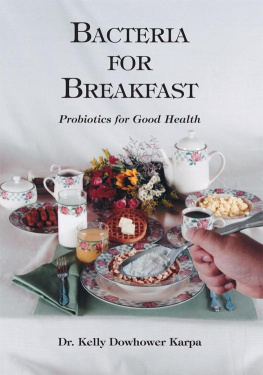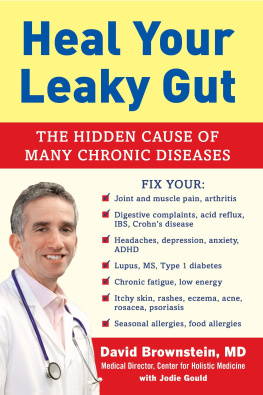Bacteria for Breakfast
Probiotics for Good Health
Kelly Dowhower Karpa, PhD, RPh
Trafford Publishing
Victoria, BC, Canada
Copyright 2003 Kelly Dowhower Karpa. All rights reserved
No part of this publication may be reproduced, stored in a retrieval system, or transmitted, in any form or by any means, electronic, mechanical, photocopying, recording, or otherwise, without the written prior permission of the author.
Note for Librarians: a cataloguing record for this book that includes Dewey Classification and US Library of Congress numbers is available from the National Library of Canada. The complete cataloguing record can be obtained from the National Librarys online database at:
www.nlc-bnc.ca/amicus/index-e.html
ISBN 9781412009256 (Sofcover)
ISBN 9781412215411 (e-book)
Information in this book is based upon experience and research conducted by the author. Every effort has been made to ensure that the information contained in this book is accurate and complete. However, neither the publisher nor the author is engaged in rendering professional services to the individual reader. This book is intended for informational purposes and is not meant to diagnose, prescribe, or substitute for appropriate medical care. You must seek advice of a health care professional before using any product or procedure described in this book. The ideas, procedures, and recommendations contained in this book are not intended to substitute for a consultation with your physician. All matters regarding your health require medical supervision.
Neither the author nor publisher shall be liable or responsible for any loss, injury, or damage allegedly arising from any information contained in this book. Mention of any product, company, physician, scientist, or research organization should in no way be misconstrued as endorsement of a particular product or technique, nor should it be misinterpreted as an endorsement of these individuals or organizations for this book.
Neither the author nor publisher condones or condemns any health treatment described in this book, but believes the information presented herewithin should be available to the public for educational purposes. Opinions expressed in this book represent the personal views of the author and not the publisher.
Cover Photography: Barry Dowhower
Editorial Assistants: Linda Lee Karpa, Patricia Dowhower, Lisa Bonfanti
Artwork: Karl Karpa
Publication Design: Ann Messner, Messner Publications, Inc.

This book was published on-demand in cooperation with Trafford Publishing.
On-demand publishing is a unique process and service of making a book available for retail sale to the public taking advantage of on-demand manufacturing and Internet marketing.
On-demand publishing includes promotions, retail sales, manufacturing, order fulfilment, accounting and collecting royalties on behalf of the author.
Suite 6E, 2333 Government St., Victoria, B.C. V8T 4P4, CANADA
Phone | 250-383-6864 | Toll-free | 1-888-232-4444 (Canada & US) |
Fax | 250-383-6804 | E-mail |
Web site | www.trafford.com | TRAFFORD PUBLISHING IS A DIVISION OF TRAFFORD HOLDINGS LTD. |
Trafford Catalogue #03-1294 | www.trafford.com/robots/03-1294.html |
10 9 8 7 6 5 4 3 2
Contents
Ridding the Gut of Some Microorganisms
While Tolerating Others
This book is dedicated to all those who have experienced chronic, persistent Clostridium difficile diarrhea or watched a loved one suffer from it. May this book help you find a cure.
I would like to acknowledge first and foremost my husband and children, whose love and patience have made this book possible. I would be remiss if I didnt also acknowledge my father, Barry Dowhower, and Dr. Mike McCann. Both of these men encouraged me to sit down and put the knowledge I gained from countless hours of literature searches on paper for the benefit of others. A special thanks to all who have shared their time, talents, and stories to help this book become a reality.
Kix, Cheerios, or bacteria? These breakfast selections are a standard joke around our house ever since my son became seriously ill. Every morning before we eat our Wheaties, we begin the day with a healthy dose of bacteria.
If you are reading this book, it is probably because you or a loved one has also been diagnosed with a medical condition. The ailment may be a problem within the gastrointestinal tract, perhaps recurrent urogenital infections, or maybe an allergic condition. For many reading this book, it is likely that traditional therapies have failed. Alternatively, perhaps you are hoping to try a more natural approach in place of conventional medicines.
Regardless of why you have picked up this book, it is important for you to understand that this book is not intended to substitute for appropriate medical intervention. Please dont use information in this book for self-diagnosis or self-medication. Instead, please take any knowledge you gain from reading this book to your physician so that together you can make an informed decision about the best way to approach your care.
As a health care professional, I did not fully appreciate the merits of probiotics until I was faced with a life threatening illness in my two-year old son. Medical training teaches health care professionals to prescribe and dispense only pharmaceuticals that have been extensively studied and reviewed by the FDA. Getting over the idea that probiotics are not FDA-approved medications is often the first hurdle that physicians and patients must overcome.
So what are probiotics? Probiotics are live microorganisms that have potential to benefit the host. The word probiotic literally means for life. Think about that for a minute...for life. Now contrast probiotic with antibiotic. We all know what antibiotics dothey kill bacteria. Probiotics, then, are the opposite of antibiotics. In other words, this book describes the merits of using bacteria and other microorganisms to treat illnesses. Of course, this notion runs counterintuitive to what we have been taught for nearly a century. Ever since the advent of antibiotics like penicillins and sulfas, we have relied, perhaps, too much, on antibiotics. Now, Im about to describe for you why we need bacteria in our bodies. It is often difficult to overcome this mental hurdle.
When you consider that probiotics have been used successfully for thousands of years, the idea of using them becomes less daunting. Fermented milk products, which contain probiotics, have been used for centuries. According to Persian tradition, Abraham of the Old Testament owed his longevity to ingestion of fermented milk. King Francis I of France was reportedly cured of an illness after eating yogurt in the early 1500s. More recently, in the early 1900s, Metchnikoff, a Russian Nobel laureate, believed high numbers of lactobacilli in the gastrointestinal tract held the keys to a long and healthy life. To prove this, he reportedly experimented on himself. Metchnikoff experienced improved health and well-being with regular ingestion of sour milk. He supposedly said,
When people have learnt how to cultivate a suitable flora in the intestines of children as soon as they are weaned from the breast, the normal life may extend to twice my 70 years (Van de Water et al., 1999). From his experience, Metchnikoff believed lactic acid-producing bacteria were antagonistic to disease-causing microorganisms and would prevent illness and disease. So you see, this probiotic stuff isnt new. Probiotics have been around for more than 5000 years.
Next page












